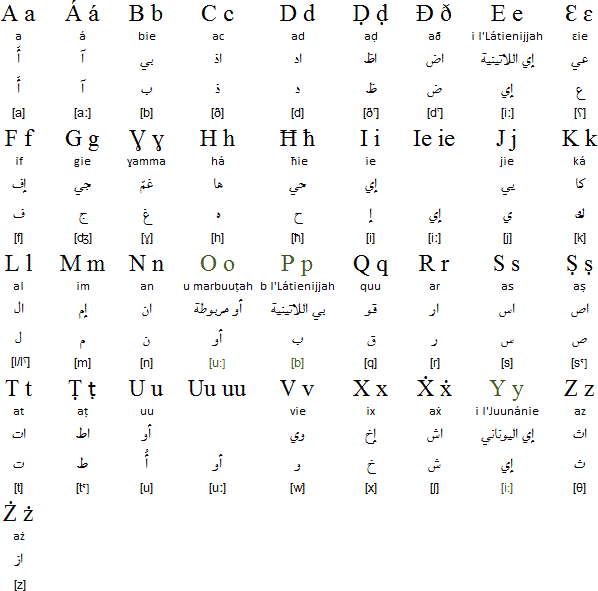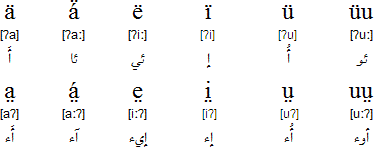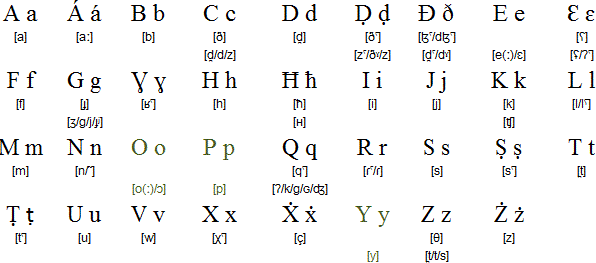Latin Arabic (L'Ɛarabijjatu l'Látienijjah)
The Latin Arabic (Arabic: العربية
اللاتينية, Latin Arabic:
L'Ɛarabijjatu l'Látienijjah) is an adaptation of Roman
alphabet for transcribing Arabic devised by Mohammad Shakeb Baig.
Its orthography preserves Arabic word boundaries.
Notable features
- Type of writing system: alphabet
- Direction of writing: left to right in horizontal lines
- Used to write: Classical Arabic, Modern Standard Arabic, Spoken Arabic
- Unlike other Romanizations for Arabic, the symbols do not have phonetic value; thus the apostrophe is used for its natural purpose.
- None of the consonants is represented by a digraph.
Latin Arabic alphabet for Modern Standard Arabic

Apart from these letters, hamza (glottal stop) is transcribed by a diereses
above or below vowels as shown below:

The dieresis is omitted if a word starts with [ʔ].
The Definite Article
A word has definite article if it is spelled in one of the following ways:
- It starts with <l> followed by a consonant or a vowel with diereses. For, example: lɣajb (the hidden), länɛám (the cattle).
- It starts with a consonant, followed by an apostrophe followed by the consonant itself. For example: ṣ'ṣádiq (the truthful).
Such words are pronounced by following rules:
- If such word is the first word in sentence, or previous word does not end in vowel, then it is pronounced with [ʔa] followed with the usual pronunciation.
- Example: <L'Qamieṣu naḍiefun.> = [ʔalqamiːsˁu naðˁiːfun]. (The shirt is clean.)
- If such word is at any other position, then previous word's last vowel is joined to first letter of this word, and rest of word is pronounced with usual pronunciation.
- Example: <Taħta nuuri ẋ'ẋamsi.> = [taħta nuːriʃʃamsi] (Under the sunlight.)
<Ẋ'Ẋarqu l'Ävsaṭu.> = [ʔaʃʃarqulʔawsatˁu] (The Middle East)
- But the name of God (الله) is transcribed differently, owing to its different pronunciation:
- If it is first word, then it is transcribed as <Alláh> and <l> is pronounced as [lˁ].
- Example: <Alláhu Akbar.> = [ʔalˁˈlˁaːhu ʔakbar] (The God is the Greatest.)
- - If it is at any other position and followed by a word ending in <a> or <u>, then previous word's last vowel is replaced by hyphen and next word is <Alláh> or <Ulláh>. Pronunciation is similar to previous rule. Examples:
- <niɛmat- Alláhi> = [niʕmatalˁˈlˁaːhi] (favour of the God.)
- <Ɛabd- Ulláh> = [ʕabdulˁˈlˁaːh] (Servant of the God.)
- But if preceding word ends with <i>, then it is transcribed by previous rules, as there is no change in pronunciation.
- Example: <Bismi l'Láhi> = [bismillaːhi] (In the name of the God).
Uses of <e>
The letter <e> is used in native Arabic words for these purposes:
- As a part of diagraph <ie>.
- When it is at the beginning of the word, then it is silent; but changes the pronunciation of the word and its previous word. The vowel at the end of the previous word is joined to the consonant after <e>.
- Example: <Va eckuruu … > = [waðkuruː] (And remember …)
- When it is at beginning of a sentence, then it is pronounced as [i].
- Example: <Ergiɛie> = [irʤiʕiː]
Capitalization
The rules of capitalization of English language are followed. Words with inherent definite article are capitalized as follows:
- If the word to be capitalised is first in a sentence, then first letter is capitalised followed by apostrophe followed by second letter in uppercase.
- If the word to be capitalised falls in middle of a sentence, then first letter is in lowercase followed by an apostrophe, followed by second letter in uppercase.
Other Rules
- Letters shown in green are used only in loanwords and foreign names for transcribing non-Arabic sounds from languages natively written by these letters in Latin script.
- Letter <e> is also used for transcribing foreign vowels which are transcribed by <e> in native script.
- Letter <y> is also used for transcribing [y] sound of Ancient Greek loanwords.
Letters for Classical Arabic and modern Arabic dialects

In this table, Latin Arabic letters and their pronunciations are given. Pronunciations in first line are that of Classical Arabic. Second line shows all the alternative pronunciations of these letters found in local dialects of Arabic.
Rules of Classical Arabic
Pronunciation of <r>
- If <r> is followed by a vowel, then it is pronounced by following rules:
- If <r> is followed by <a, á, u, uu> then it is pronounced as [ɾˤ]
- If it is followed by <i, ie> then it is pronounced as [ɾ].
- If it is followed by a consonant, or is last letter of a word than following rules apply:
- If following letter is one of <ḍ, ð, ɣ, q, ṣ, ṭ, x> followed by one of <a, á, u, uu> and preceding letter is one of <i, ie>, then it is pronounced as [ɾˤ]. Example: <mirṣádan> = [miɾˤsˤaːd̪an]
- If preceding letter is one of <a, á, e, u, uu> or a consonant then it is pronounced as [ɾˤ].
- If preceding letter is one of <i, ie>, then it is pronounced as [ɾ].
- If it is last letter of a sentence, then following rules apply:
- If the preceding letter is <ie, j> then it is pronounced as [ɾ].
- If the third last letter is <a, u, uu> then it is pronounced as [ɾˤ]. Example: <Va lɛaṣr.> = [walʕasˤɾˤ].
- If preceding letter is not among <ḍ, ð, ɣ, q, ṣ, ṭ, x> and third last letter is <i>, then it is pronounced as [ɾ]. Example: <…qasamun l’licie ħigr.> = [qˤasamul liðiː ħiɟɾ]
Pronunciation of <n>
These rules are governed by the letter which follows <n>. If it is last letter of a word then first letter of next word is used.
- If <n> is followed by a vowel or one of the <ɛ, ɣ, h, ħ, x> or a letter with diereses above, or it is the last letter of a sentence; then it is pronounced as [n]. Example: <… nárun ħámijah.> = [naːɾˁun ħaːmijah]
- If it is followed by <b> then it is pronounced as [m].
- If it is followed by <m> then it is pronounced as [˜m].
- If it is followed by <j> or <v> within a word then, it is pronounced as [n]. But if it is followed by them at word boundary, then the sequences <-n j-> and <-n v-> are pronounced as [˜jj] and [˜ww] respectively. Example: <bunjánun> = [bunjaːnun] but <…min váq.> = [mi˜wwaːqˁ]
- If it is followed by <l> or <r>, then it is silent and following letter is doubled. Example: <Vajlun likulli humażatin lumażah.> = [wajlul likulli humazat̪il lumazah]
- If it is followed by <n> itself, then it is pronounced as [˜n]
- If it is followed by any other letter, then it is pronounced as [˜]. Example: <…máän zaggágá.> = [maːʔa˜ θaɟɟaːɟaː]
Pronunciation of <m>
- If <m> is followed by <b> then it is pronounced as [˜]. Example: <tarmiehim biħigáratin> = [t̪aɾˤmiːhi˜ biħiɟaːɾˤat̪in]
- If it is followed by another <m> then sequence <mm> is pronounced as [˜]. Example: <aṭɛamahum min> = [ʔatˁʕamahu˜in]
- If it is followed by any other letter then it is pronounced as [m].
Sample texts
Sample text for Classical Arabic

Original Text
وَمِنْ ءَايَـٰتِهِۦ خَلْقُ ٱلسَّمَـٰوَٰتِ وَٱلْأَرْضِ وَٱخْتِلَـٰفُ أَلْسِنَتِكُمْ وَأَلْوَٰنِكُمْ ۚ إِنَّ فِى ذَٰلِكَ لَـَٔايَـٰتٍ لِّلْعَـٰلِمِينَ ﴿٢٢﴾
Translation
And among His Signs
Is the creation of the heavens
And the earth, and the variations
In your languages
And your colours: verily
In that are Signs
For those who know.
Sample Text for Modern Standard Arabic

Original Text
يولد جميع الناس أحراراً متساوين في الكرامة و الحقوق. و قد وهبوا عقلاً و ضميراً و عليهم ان يعامل بعضهم بعضاً بروح الإخاء.
Sample Text for Egyptian Arabic

Original Text
المادة الأولانية البني أدمين كلهم مولودين حرين ومتساويين في الكرامة والحقوق. إتوهبلهم العقل والضمير، والمفروض يعاملوا بعض بروح الأخوية.
Translation
All human beings are born free and equal in dignity and rights. They are endowed with
reason and conscience and should act towards one another in a spirit of brotherhood.
(Article 1 of the Universal Declaration of Human Rights)
Adapated scripts by Mohammad Shakeb Baig
Arabic Greek,
Greek Arabic,
Latin Arabic,
Roman Rekhta
Constructed scripts for: Ainu |
Arabic |
Chinese languages |
Dutch |
English |
Hawaiian |
Hungarian |
Japanese |
Korean |
Lingala |
Malay & Indonesian |
Persian |
Tagalog / Filipino |
Russian |
Sanskrit |
Spanish |
Taino |
Turkish |
Vietnamese |
Welsh |
Other natural languages |
Colour-based scripts |
Tactile scripts |
Phonetic/universal scripts |
Constructed scripts for constructed languages |
Adaptations of existing alphabets |
Fictional alphabets |
Magical alphabets |
A-Z index |
How to submit a constructed script
[top]

You can support this site by Buying Me A Coffee, and if you like what you see on this page, you can use the buttons below to share it with people you know.

If you like this site and find it useful, you can support it by making a donation via PayPal or Patreon, or by contributing in other ways. Omniglot is how I make my living.
Note: all links on this site to Amazon.com , Amazon.co.uk
, Amazon.co.uk and Amazon.fr
and Amazon.fr are affiliate links. This means I earn a commission if you click on any of them and buy something. So by clicking on these links you can help to support this site.
are affiliate links. This means I earn a commission if you click on any of them and buy something. So by clicking on these links you can help to support this site.
[top]







, Amazon.co.uk
and Amazon.fr
are affiliate links. This means I earn a commission if you click on any of them and buy something. So by clicking on these links you can help to support this site.